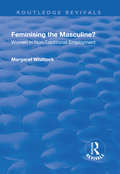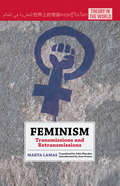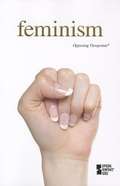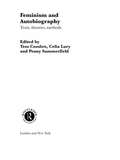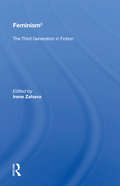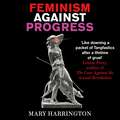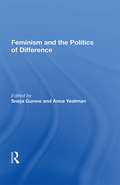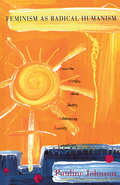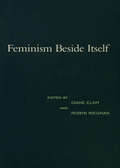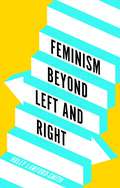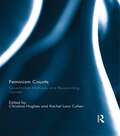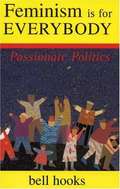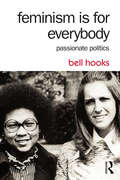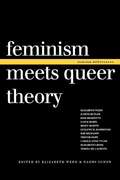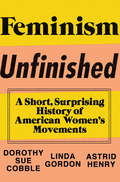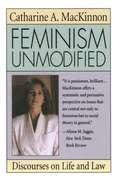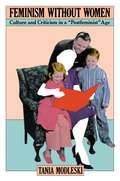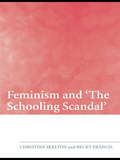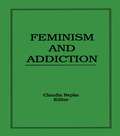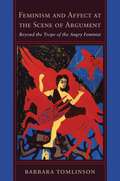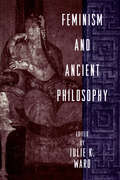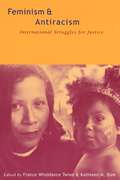- Table View
- List View
Femininity: The Enigma of Gender Identity
by Riccardo DriIn this thought-provoking book, the author explores the intricate dynamics of gender identity, challenging conventional ideas about what defines being a man or a woman. The narrative underscores the critical distinction between sex—biological differences—
Feminising the Masculine?: Women in Non-traditional Employment (Routledge Revivals)
by Margaret WhittockThis title was first published in 2000: This work aims to provide a comparative and temporal assessment of the position of women in non-traditional employment in Europe, Britain and Northern Ireland. Its second aim is to provide a new perspective on the division of labour in modern Western societies and to critically examine the issues, debates and perspectives which have traditionally dominated portrayals of women and paid employment. The book assesses the potential which women themselves have for transforming existing gender relations, particularly within the structural constraints of the education, training and employment systems. In so doing, it is intended to highlight flaws inherent in much contemporary feminist theorizing, and aims to provide a more satisfactory theoretical framework within which to elaborate and develop its arguments. While related texts have tended to concentrate on stereotypical notions of women and paid employment, this book aims to fill a gap in the literature by scrutinizing the lived experiences of women in non-traditional manual occupations, and relating these to a possible transformation of the existing gender order in Western societies
Feminism
by Marta LamasAdding to the debate on a range of issues, this book presents a critical and deeply personal history of Mexican feminism in the last thirty five years. Drawing from her many years of activism and anthropological scholarship, influential thinker Marta Lamas covers topics such as the political development of the feminist movement, affirmative action in the workplace, conceptual advances in regard to gender, and disagreements among feminists. Here in English for the first time, this work offers invaluable insight into the theoretical and political tensions that have shaped Mexican feminism and the world at large.
Feminism
by Nancy DziedzicThis book is one volume of the highly acclaimed Opposing Viewpoints Series developed by Greenhaven Press focusing on feminism.
Feminism & Autobiography: Texts, Theories, Methods (Transformations)
by Celia Lury Penny Summerfield Tess CoslettFeaturing essays by leading feminist scholars from a variety of disciplines, this key text explores the latest developments in autobiographical studies. The collection is structured around the inter-linked concepts of genre, inter-subjectivity and memory. Whilst exemplifying the very different levels of autobiographical activity going on in feminist studies, the contributions chart a movement from autobiography as genre to autobiography as cultural practice, and from the analysis of autobiographical texts to a preoccupation with autobiography as method.
Feminism - The Essential Historical Writings
by Miriam SchneirThe vast majority of women are unaware of the great feminist writings of the past.
Feminism 3: The Third Generation In Fiction
by Irene ZahavaThis book is a collection of short stories by third generation feminists, covering major issues in a young woman's life: awakening sexuality, biological and psychological landmarks, family rejection and rebellion, child abduction and abuse, gender identification, and sexual harassment.
Feminism Against Progress
by Mary HarringtonIn Feminism Against Progress, Mary Harrington argues that the industrial-era faith in progress is turning against all but a tiny elite of women. Women's liberation was less the result of human moral progress than an effect of the material consequences of the Industrial Revolution. We've now left the industrial era for the age of AI, biotech and all-pervasive computing. As a result, technology is liberating us from natural limits and embodied sex differences. Although this shift benefits a small class of successful professional women, it also makes it easier to commodify women's bodies, human intimacy and female reproductive abilities.This is a stark warning against a dystopian future whereby poor women become little more than convenient sources of body parts to be harvested and wombs to be rented by the rich. Progress has now stopped benefiting the majority of women, and only a feminism that is sceptical of it can truly defend female interests in the 21st century
Feminism And The Politics Of Difference
by Anna Yeatman Sneja GunewVersions of Jacki Huggins's 'Pretty deadly tidda business' have appeared in Hecate vol. 17, no. 1; 1991, I lndyk, ed.; Memory (Southerly 3, 1991) HarperCollins, Sydney, 1991; Second Degree Tampering, Sybylla Feminist Press, Melbourne, 1992. Laleen Jayamanne's 'Love me tender, love me true ... ' was first published in Framework 38139, 1992. A version of Smaro Kamboureli's 'Of black angels and melancholy lovers' appeared in Freelance (Saskatchewan Writers' Guild), xxi, 5 (Dec. 1991-Jan. 1992). Roxana Ng's 'Sexism, racism and Canadian nationalism' appeared in Race, Class, Gender: Bonds and Barriers, Socialist Studies/Etudes Socialistes: A Canadian Annual no. 5, 1989. Trinh Minh-ha's 'All-owning spectatorship' has also appeared in her collection of essays When the Moon Waxes Red, Routledge, NY, 1991.
Feminism As Radical Humanism
by Pauline JohnsonFeminism is currently at an impasse. Both the liberation feminism of the 1970's and the more recent feminism of difference are increasingly faced with the limitations of their own perspectives. While feminists today generally acknowledge the need to recognise diversity, they lack a coherent framework through which this need can be articulated. In "Feminism as Radical Humanism", Pauline Johnson calls for a reassessment of feminism's relationship to modern humanism. She argues that despite its very thorough and necessary critique of mainstream formulations of humanist ideals, feminism itself remains strongly committed to humanist values. Drawing on a broad range of political and intellectual traditions, Johnson demonstrates that, only by proudly affirming its own humanist commitments can feminist theory find a way to negotiate the impasse in which it currently finds itself. "Feminism as Radical Humanism" is an important and controversial contribution to feminist theory, and to the ongoing debate about the meaning of contemporary humanism.
Feminism Beside Itself
by Robyn Wiegman Diane ElanFirst published in 1995. Routledge is an imprint of Taylor & Francis, an informa company.
Feminism Beyond Left and Right
by Holly Lawford-SmithAn unquestioned assumption of contemporary politics is that the left owns minority groups, in the sense that the left, exclusively, champions the interests of minorities and is for that reason owed the allegiance of minorities. This, in turn, gives rise to the sense of dissonance created by right-wing dissenters—the black social conservative, the gay ultra-nationalist, the female libertarian, the poor pro-capitalist. This same dissonance exists for women and feminism, creating a default assumption that a feminist is a left-wing woman. We don’t make a distinction between left-wing feminists and feminists; we don’t need to.There’s nothing a philosopher loves more than an unquestioned assumption, and in this book political philosopher Holly Lawford-Smith systematically dismantles the assumption that feminism is an exclusively left-wing project. Once dismantled, the path is clear to a new set of questions. Who counts as a feminist in the first place? If women from anywhere on the political spectrum can be feminists, who is it that feminists should—or shouldn't—be working with? And what can be said, more generally, about the ethics of alliances and coalitions?In Feminism Beyond Left and Right Lawford-Smith makes the case for non-partisan feminism, feminism outside the constraints of the left-right political spectrum, a feminism for and about all women as women.
Feminism Counts: Quantitative Methods and Researching Gender
by Rachel Lara Cohen Christina HughesThis is an important and timely text that provides a unique overview of contemporary quantitative approaches to gender research. The contributors are internationally recognised researchers from the UK, USA and Sweden who occupy a range of disciplinary locations, including historical demography, sociology and policy studies. Their research includes explorations of heterosexual and same sex violence, media responses to feminist research, data sources for the study of equalities, approaches for analysing global and local demographic change and intersectional concerns in respect of work and employment.Through detailed, sophisticated and thoughtful considerations of the place of quantification within gender studies, and the place of feminist approaches to quantification, each contributor overturns the stereotype that quantitative research is antithetical to feminism by demonstrating its importance for challenging continuing global inequalities associated with gendered outcomes. An introductory chapter illustrates the significance of geography and discipline in the take-up of methodological preferences.Feminism Counts: Quantitative Methods and Researching Gender makes an important contribution to the ways in which feminists respond to contemporary methodological and interdisciplinary challenges, and is essential reading for all research students in gender studies.This book was originally published as a special issue of the International Journal of Social Research Methodology.
Feminism Is for Everybody: Passionate Politics
by Bell HooksHooks is a vision of a beloved community that appeals to all those committed to equality, mutual respect, and justice. Hooks applies her critical analysis to the most contentious and challenging issues facing feminists today, including reproductive rights, violence, race, class, and work. With her customary insight and unsparing honesty, Hooks calls for a feminism free from divisive barriers but rich with rigorous debate. In language both eye-opening and optimistic, Hooks encourages us to demand alternatives to patriarchal, racist, and homophobic culture, and to imagine a different future. Hooks speaks to all those in search of true liberation, asking readers to take look at feminism in a new light, to see that it touches all lives. Issuing an invitation to participate fully in feminist movement and to benefit fully from it, Hook's shows that feminism -- far from being an outdated concept or one limited to an intellectual elite -- is indeed for everybody.
Feminism Is for Everybody: Passionate Politics (Second Edition)
by Bell HooksWhat is feminism? In this short, accessible primer, bell hooks explores the nature of feminism and its positive promise to eliminate sexism, sexist exploitation, and oppression. With her characteristic clarity and directness, hooks encourages readers to see how feminism can touch and change their lives--to see that feminism is for everybody.
Feminism Meets Queer Theory
by Elizabeth Weed Naomi Schor"... innovative and important thinking about the various relations between feminist theory, queer theory, and lesbian theory, as well as the possibility that liberation can be mutual rather than mutually exclusive. " -- Lambda Book Report. When feminism meets queer theory, no introductions seem necessary. The two share common political interests -- a concern for women's and gay and lesbian rights -- and many of the same academic and intellectual roots. And yet, they can also seem like strangers, needing mediation, translation, clarification. This volume focuses on the encounters of feminist and queer theories, on the ways in which basic terms such as "male" and "female," "man" and "woman," "black," "white," "sex," "gender," and "sexuality" change meaning as they move from one body of theory to another. Along with essays by Judith Butler, Evelynn Hammonds, Biddy Martin, Kim Michasiw, Carole-Anne Tyler, and Elizabeth Weed, there are interviews: Judith Butler engages Rosi Braidotti and Gayle Rubin in separate revealing discussions. And there are critical exchanges: Rosi Braidotti and Trevor Hope exchange comments on his reading of her work; and Teresa de Lauretis responds to Elizabeth Grosz's review of her recent book.
Feminism Unfinished: A Short, Surprising History of American Women's Movements
by Dorothy Sue Cobble Linda Gordon Astrid HenryReframing feminism for the twenty-first century, this bold and essential history stands up against "bland corporate manifestos" (Sarah Leonard). <P><P> Eschewing the conventional wisdom that places the origins of the American women's movement in the nostalgic glow of the late 1960s, Feminism Unfinished traces the beginnings of this seminal American social movement to the 1920s, in the process creating an expanded, historical narrative that dramatically rewrites a century of American women's history. Also challenging the contemporary "lean-in," trickle-down feminist philosophy and asserting that women's histories all too often depoliticize politics, labor issues, and divergent economic circumstances, Dorothy Sue Cobble, Linda Gordon, and Astrid Henry demonstrate that the post-Suffrage women's movement focused on exploitation of women in the workplace as well as on inherent sexual rights. The authors carefully revise our "wave" vision of feminism, which previously suggested that there were clear breaks and sharp divisions within these media-driven "waves." Showing how history books have obscured the notable activism by working-class and minority women in the past, Feminism Unfinished provides a much-needed corrective.
Feminism Unmodified: Discourses On Life And Law
by Catharine MacKinnonCatharine A. MacKinnon, noted feminist and legal scholar, explores and develops her original theories and practical proposals on sexual politics and law. These discourses, originally delivered as speeches, have been brilliantly woven into a book that retains all the spontaneity and accessibility of a live presentation. MacKinnon offers a unique retrospective on the law of sexual harassment, which she designed and has worked for a decade to establish, and a prospectus on the law of pornography, which she proposes to change in the next ten years. Authentic in voice, sweeping in scope, startling in clarity, urgent, never compromised and often visionary, these discourses advance a new theory of sex inequality and imagine new possibilities for social change. Through these engaged works on issues such as rape, abortion, athletics, sexual harassment, and pornography, MacKinnon seeks feminism on its own terms, unconstrained by the limits of prior traditions. She argues that viewing gender as a matter of sameness and difference--as virtually all existing theory and law have done--covers up the reality of gender, which is a system of social hierarchy, an imposed inequality of power. She reveals a political system of male dominance and female subordination that sexualizes power for men and powerlessness for women. She analyzes the failure of organized feminism, particularly legal feminism, to alter this condition, exposing the way male supremacy gives women a survival stake in the system that destroys them.
Feminism Without Women: Culture and Criticism in a "Postfeminist" Age
by Tania ModleskiIn a series of essays scrutinizing feminist and post-structuralists positions, Tania Modleski examines "the myth of postfeminism" and its operation in popular culture, especially popular film and cultural studies. (First published in 1991.)
Feminism against Progress
by Mary HarringtonModern feminism increasingly benefits only a small class of professional women. There is no reason to sacrifice everyone else's happiness for their sake.Mary Harrington shows that women's liberation was less the result of moral progress than an effect of the material consequences of the Industrial Revolution. We've now left the industrial era for the digital age, in which technology is liberating us from natural limits and embodied sex differences. This shift may benefit the elites, but it also makes it easier to commodify women's bodies, human intimacy, and female reproductive abilities. "Feminism" has been captured by well-off white-collar women, who use it to advance their own economic and political interests under the pretense that these are the interests of all women—all the while wielding the term like a club against anyone, male or female, who dissents. Feminism against Progress is a stark warning against a dystopian future in which poor women become little more than convenient sources of body parts to be harvested and wombs to be rented by the rich. "Progress" no longer benefits the majority of women, and only a feminism that is skeptical of it can truly defend their interests in the twenty-first century.
Feminism and 'The Schooling Scandal'
by Christine Skelton Becky FrancisFeminism and ‘The Schooling Scandal’ brings together feminist contributions from two generations of educational researchers, evaluating and celebrating the field of gender and education. The focus throughout is on the years of compulsory schooling, examining key concepts in gender and education identified and developed by international thinkers in educational feminism. Topics covered include: social class, ethnicity and sexuality in relation to experiences in school; theories and methodologies for understanding gender; pedagogy and practice in education; and the direction of educational policy and the ‘problem of boys’. Providing a comprehensive overview of contemporary research and theory emerging from ‘second wave’ feminism and assessing their impact on pupils and teachers in today’s schools and classrooms, this book forms essential reading for anyone studying gender and education.
Feminism and Addiction
by Claudia BepkoFeminism is a beneficial force in addictions therapy as they have the same goals--mending imbalances of power. A variety of important topics related to addictions treatment are addressed in this timely volume, accompanied by concrete clinical solutions for therapists and counselors to use in their own practice. Feminism and Addiction demonstrates the positive impact feminism can have on addictions treatment. Addictions treatment methods that have been developed primarily based on research with men are examined and questioned to determine what changes need to be made to meet the needs of women. The applicability of twelve-step treatment programs, for example, is investigated as to whether its required adoption of belief in powerlessness is concurrent with feminism’s battle with female subjugation. This thought-provoking volume contains the most current theoretical, social, and clinical issues enmeshed in the debates between men’s experiences and women’s experiences of addiction. Critical issues addressed include advice for how to deal with issues of codependency; how to treat clients faced with physical or sexual abuse in addition to addiction; how to integrate cultural differences into treatment; and how to face the particular difficulties of gay and lesbian clients in addictions treatment. This valuable book will help you apply constructivist approaches to build therapy methods which are collaborative, internal, and organic, thus more appropriate to treating women’s experience with addiction. Feminism and Addiction helps family therapists who work with women and their families strike a unique balance between the principles of feminism and family therapy’s goal of repairing and healing relationships between men and women.
Feminism and Affect at the Scene of Argument: Beyond the Trope of the Angry Feminist
by Barbara TomlinsonAre feminists really angry, unreasoning, man-haters who argue only from an emotional perspective as some claim? Does the incessant repetition of this trope make anti-feminism and misogyny a routine element in everyday speech? And does this repetition work towards delegitimizing feminist arguments and/or undermining feminist politics? How do skilled feminist writers deploy affect to advance feminist ideas? InFeminismand Affect at the Scene of Argument,Barbara Tomlinson addresses these questions, providing a lucid examination of the role of affect in feminist and antifeminist academic arguments. Using case studies from controversies in socio-legal studies, musicology, and science studies, among other disciplines, Tomlinson examines the rhetorics of anger, contempt, betrayal, intensification, and ridicule. She employs a set of critical tools—feminist “socio-forensic” discursive analysis—that will prove indispensible for understanding and countering tropes like that of the angry feminist. Moreover, these tools will advance feminism, which, she argues, is generated in and by arguments with allies and antagonists.
Feminism and Ancient Philosophy
by Julie K. WardAn important volume connecting classical studies with feminism, Feminism and Ancient Philosophy provides an even-handed assessment of the ancient philosophers' discussions of women and explains which ancient views can be fruitful for feminist theorizing today. The papers in this anthology range from classical Greek philosophy through the Hellenistic period, with the predominance of essays focusing on topics such as the relation of reason and the emotions, the nature of emotions and desire, and related issues in moral psychology. The volume contains some new, ground-breaking essays on Plato, Aristotle, and the Stoics, as well as previously published pieces by established scholars like Martha Nussbaum and Julia Annas. It promises to be of interest to an interdisciplinary audience including those working in classics, ancient philosophy, and feminist theory.
Feminism and Antiracism: International Struggles for Justice
by France Winddance Twine and Kathleen M. BleeA collection of international scholars and activists answer the questionshow does gender and region/nation play a defining role in how feminists engage in anti-racist practices? How has the restructuring in the world economy affected anti-racist organizing? How do Third World Feminists counter the perception that feminism is a "Western" ideology and how effective are their methods? What opportunities does globalization bring for cross-cultural organizing? From essays on the race and gender issues in organizing exotic dancers to resistance art in Africa and the U.S., this timely and necessary anthology will be sure to spark debate and controversy. Contributors: Angela Davis, Kathleen Blee, France Winddance Twine, Heater Merrill, Veronica Magar, Siobhan Brooks, Delores Walters, Michelle Rosenthal, Ellen Kaye Scott, andrea breen, Yoshiko Nozaki, Sohera Syeda, Becky Thompson, Paola Bacchetta, Carolyn Martin Shaw, Eileen O'Brien and Michael Armato, Jane Freedman, Cathleen Armstead, Ashwini Deshpande, and Minelle Mahtani.

